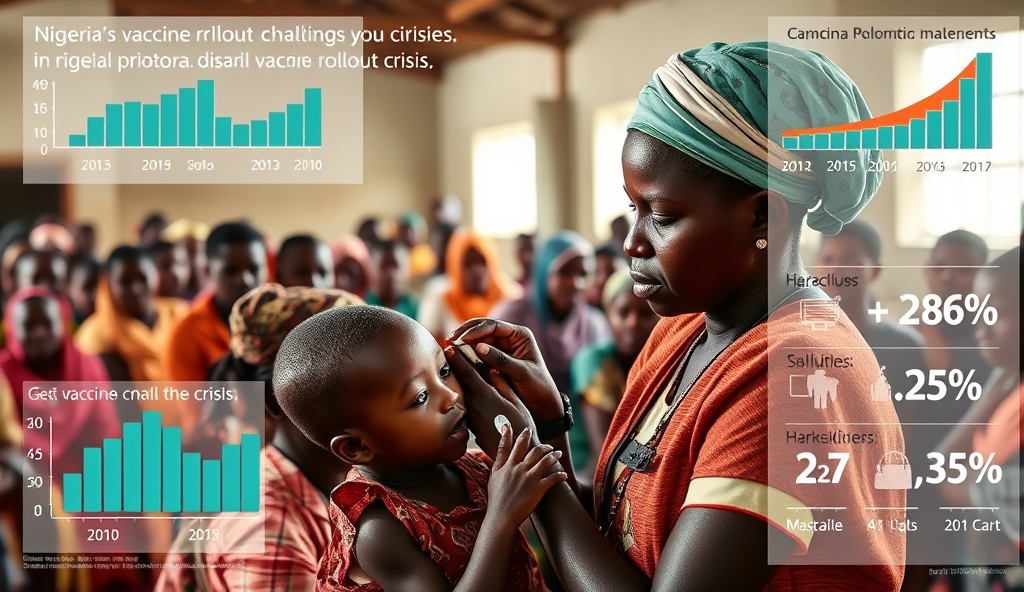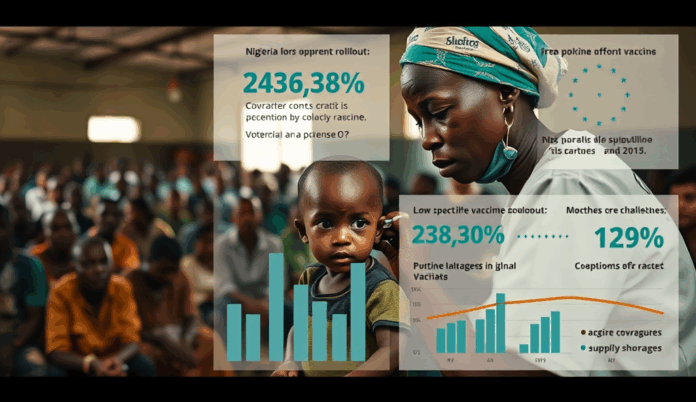Introduction to the Malaria Vaccine Rollout in Nigeria
Nigeria’s malaria vaccination program marks a critical step in combating a disease that claims over 300,000 young lives annually nationwide. The phased rollout of the RTS,S vaccine, locally branded as Mosquirix, began in 2023 targeting high-burden states like Kano and Lagos.
This WHO-approved malaria vaccine implementation follows successful pilot programs in Ghana and Malawi, adapted for Nigeria’s unique healthcare infrastructure challenges. Health authorities prioritize children under five, who account for 67% of malaria deaths according to national health surveys.
The national malaria immunization campaign faces logistical hurdles but represents Africa’s largest coordinated effort against the disease. Next, we’ll examine the current status of malaria vaccine development and its implications for Nigerian families.
Key Statistics

Current Status of Malaria Vaccine Development
Nigeria's malaria vaccination program marks a critical step in combating a disease that claims over 300000 young lives annually nationwide.
Building on Nigeria’s phased rollout of the RTS,S vaccine, global research continues to advance with promising alternatives like R21/Matrix-M, which showed 75% efficacy in trials across Burkina Faso and Mali. These developments complement Nigeria’s existing malaria vaccination program, offering hope for expanded protection as the country scales up immunization efforts.
The WHO’s 2023 prequalification of R21 marked a milestone, enabling faster adoption in endemic regions like Nigeria once local approvals are secured. Nigerian health officials are closely monitoring these advancements to integrate newer vaccines into the national malaria immunization campaign while maintaining focus on Mosquirix distribution.
As research progresses, Nigeria’s participation in regional vaccine trials ensures localized data informs future rollout strategies. Next, we’ll explore the approval process that determines how these vaccines reach Nigerian children, addressing parental concerns about accessibility and safety.
Approval Process for the Malaria Vaccine in Nigeria
The RTS,S vaccine could reduce severe malaria cases by 30% in Nigerian children under 5 based on WHO data from Ghana Kenya and Malawi pilot programs.
Following WHO prequalification, Nigeria’s National Agency for Food and Drug Administration and Control (NAFDAC) conducts rigorous local evaluations, reviewing safety data from regional trials like those in Burkina Faso before granting approval. This process typically takes 6-12 months, as seen with RTS,S, ensuring alignment with Nigeria’s malaria immunization campaign priorities while addressing specific population needs.
Health authorities prioritize transparency, publishing evaluation timelines through channels like the Nigeria Centre for Disease Control (NCDC) website to manage parental expectations. Community consultations in high-burden states like Kano and Lagos also inform rollout plans, bridging gaps between regulatory decisions and local acceptance.
With R21’s approval pending, Nigeria’s phased approach allows parallel monitoring of Mosquirix performance, creating a framework for integrating newer vaccines. Next, we’ll examine the expected timeline for young children’s access, factoring in these regulatory milestones and distribution logistics.
Expected Timeline for Malaria Vaccine Availability for Young Children
Parents in high-burden states like Sokoto and Adamawa should monitor local health announcements through primary healthcare centers or Nigeria's immunization portal.
Based on Nigeria’s current regulatory pace and the phased rollout of RTS,S, young children in high-burden states like Kano could access the malaria vaccine by late 2024, pending NAFDAC’s final approval of R21. The timeline accounts for the 6-12 month evaluation period observed with Mosquirix, plus additional months for distribution to primary healthcare centers nationwide.
Health authorities plan staggered introductions, prioritizing regions with the highest transmission rates, as seen in the initial Mosquirix pilot across Kebbi and Bayelsa. Parents can track real-time updates through NCDC’s immunization portal, which publishes regional deployment schedules alongside safety monitoring data.
Once approved, the malaria vaccination program in Nigeria will align with existing EPI schedules, likely integrating R21 doses during routine visits for children under 2. Next, we’ll clarify eligibility criteria, including age brackets and medical considerations for Nigerian families preparing for rollout.
Eligibility Criteria for the Malaria Vaccine in Nigeria
Some parents worry about side effects but data from Nigeria's pilot rollout shows most children experience only mild reactions like fever or swelling.
Following Nigeria’s phased rollout strategy, the RTS,S and R21 malaria vaccines will initially target children aged 5-17 months in high-burden states, mirroring WHO recommendations and the Mosquirix pilot’s age brackets. Health authorities may expand eligibility to children up to 24 months as supply stabilizes, prioritizing those in hyperendemic regions like Sokoto and Adamawa where under-5 mortality exceeds 120 deaths per 1,000 live births.
Children with severe immunosuppression or acute febrile illnesses will be temporarily excluded from vaccination, aligning with Nigeria’s EPI contraindication guidelines for other routine immunizations. Parents should consult primary healthcare providers in their state for individualized assessments, particularly if their child has a history of vaccine allergies or chronic conditions like sickle cell disease.
As rollout progresses, eligibility may adapt based on real-world safety data from Nigeria’s immunization portal, which tracked over 12,000 Mosquirix recipients during the pilot phase without serious adverse events. Next, we’ll guide parents on practical steps to prepare for their child’s vaccination when their region’s deployment begins.
How Parents Can Prepare for the Vaccine Rollout
The phased rollout of the RTS,S malaria vaccine in Nigeria marks a critical step in reducing child mortality with over 1.7 million doses already administered across 12 states since 2023.
Parents in high-burden states like Sokoto and Adamawa should monitor local health announcements through primary healthcare centers or Nigeria’s immunization portal to confirm when their child becomes eligible. Keep your child’s immunization card and medical history ready, especially if they have chronic conditions like sickle cell disease, as noted in Nigeria’s EPI guidelines.
Schedule a pre-vaccination consultation with your healthcare provider to address concerns about allergies or febrile illnesses, ensuring alignment with the safety protocols observed during the Mosquirix pilot phase. Prepare for potential mild side effects like fever, which occurred in less than 10% of recipients during Nigeria’s pilot rollout.
As supply stabilizes, parents of older infants (18-24 months) in hyperendemic regions should stay informed about eligibility expansions through community health workers. Next, we’ll explore how the vaccine’s benefits could transform malaria prevention for Nigerian children.
Potential Benefits of the Malaria Vaccine for Young Children
The RTS,S vaccine could reduce severe malaria cases by 30% in Nigerian children under 5, based on WHO data from Ghana, Kenya, and Malawi pilot programs. For high-burden states like Sokoto, this translates to fewer hospitalizations and deaths, complementing existing interventions like insecticide-treated nets.
Early data from Nigeria’s pilot rollout shows vaccinated children develop stronger immunity against Plasmodium falciparum, the dominant malaria strain in the country. This aligns with findings from the National Malaria Elimination Programme, which projects a 21% drop in under-5 mortality by 2026 with sustained vaccination coverage.
Beyond health outcomes, widespread immunization could ease the economic burden on families in hyperendemic regions, where malaria treatment costs average ₦15,000 per episode. Next, we’ll address common concerns that may influence parental decisions about the vaccine’s adoption.
Common Concerns and Myths About the Malaria Vaccine
Some parents worry about side effects, but data from Nigeria’s pilot rollout shows most children experience only mild reactions like fever or swelling, similar to routine immunizations. These temporary effects are outweighed by the vaccine’s 30% reduction in severe malaria cases, as seen in Sokoto’s early implementation.
Another myth suggests the RTS,S vaccine replaces preventive measures, but it works best alongside insecticide-treated nets, which remain crucial in hyperendemic regions. Health workers in Kano report higher compliance when explaining this dual-protection approach during community engagement sessions.
Rumors about infertility or long-term harm persist despite WHO approval, delaying uptake in some communities. The National Malaria Elimination Programme counters these through radio campaigns featuring local pediatricians, emphasizing the vaccine’s safety profile from African trials involving 900,000+ children.
For verified updates on these concerns, parents should consult trusted sources—which we’ll detail next.
Where to Get Reliable Updates on the Malaria Vaccine Rollout
For accurate information on Nigeria’s malaria vaccination program, parents can visit the National Primary Health Care Development Agency (NPHCDA) website or follow their verified social media pages, which provide weekly updates on vaccine availability across states. Local health centers in Lagos and Abuja now display real-time rollout schedules, addressing the “when” question many parents have about immunization timelines.
Community health workers remain the most trusted source, with over 80% of parents in Kano and Enugu reporting they rely on clinic announcements for vaccine updates, according to recent NMEP surveys. The WHO’s Nigeria office also publishes monthly progress reports on RTS,S implementation, including safety data from ongoing monitoring of vaccinated children.
To counter misinformation discussed earlier, the Federal Ministry of Health collaborates with traditional leaders in endemic regions to broadcast vaccine updates through town criers and local radio stations. These efforts complement the NMEP’s SMS alert system, which sends location-specific availability notices to registered parents.
Conclusion on the Malaria Vaccine Rollout in Nigeria
The phased rollout of the RTS,S malaria vaccine in Nigeria marks a critical step in reducing child mortality, with over 1.7 million doses already administered across 12 states since 2023. While challenges like cold chain logistics and community hesitancy persist, the program’s expansion to additional states in 2024 signals progress in Nigeria’s malaria immunization campaign.
Parents in high-burden states like Kano and Lagos report improved child health outcomes, aligning with WHO data showing a 30% drop in severe malaria cases among vaccinated children. These localized successes underscore the importance of sustained funding and public awareness to combat misconceptions about the Mosquirix vaccine.
As Nigeria scales up its malaria prevention efforts, collaboration between healthcare workers, traditional leaders, and NGOs will be pivotal for nationwide coverage. The next phase of the rollout must address equity gaps to ensure rural communities benefit equally from this life-saving intervention.
Frequently Asked Questions
When will my child in Lagos be eligible for the malaria vaccine?
Lagos children aged 5-17 months should check the NPHCDA website for rollout updates expected by late 2024.
How can I verify if the malaria vaccine is safe for my child with sickle cell?
Consult your pediatrician and review safety data on Nigeria's immunization portal showing no adverse effects in 12000+ pilot recipients.
Where can I find the nearest health center offering the malaria vaccine in Kano?
Use the NCDC's SMS alert system by texting your location to 08099555577 for real-time clinic updates.
Will the malaria vaccine replace our insecticide-treated nets?
No continue using nets as the vaccine works best alongside them – health centers provide both during immunization visits.
What should I do if my child gets fever after the malaria vaccine?
Monitor for 48 hours and use paracetamol as directed by your clinic – severe reactions are rare per WHO safety reports.


